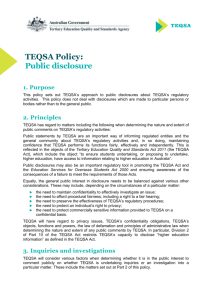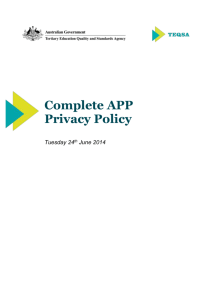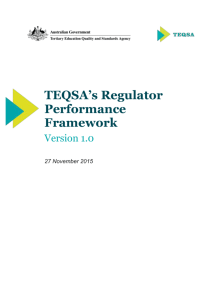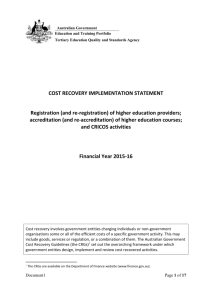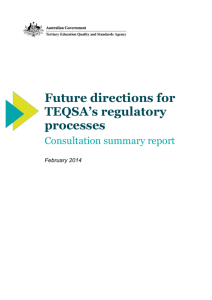Report on Student Academic Integrity and Allegations of Contract
advertisement
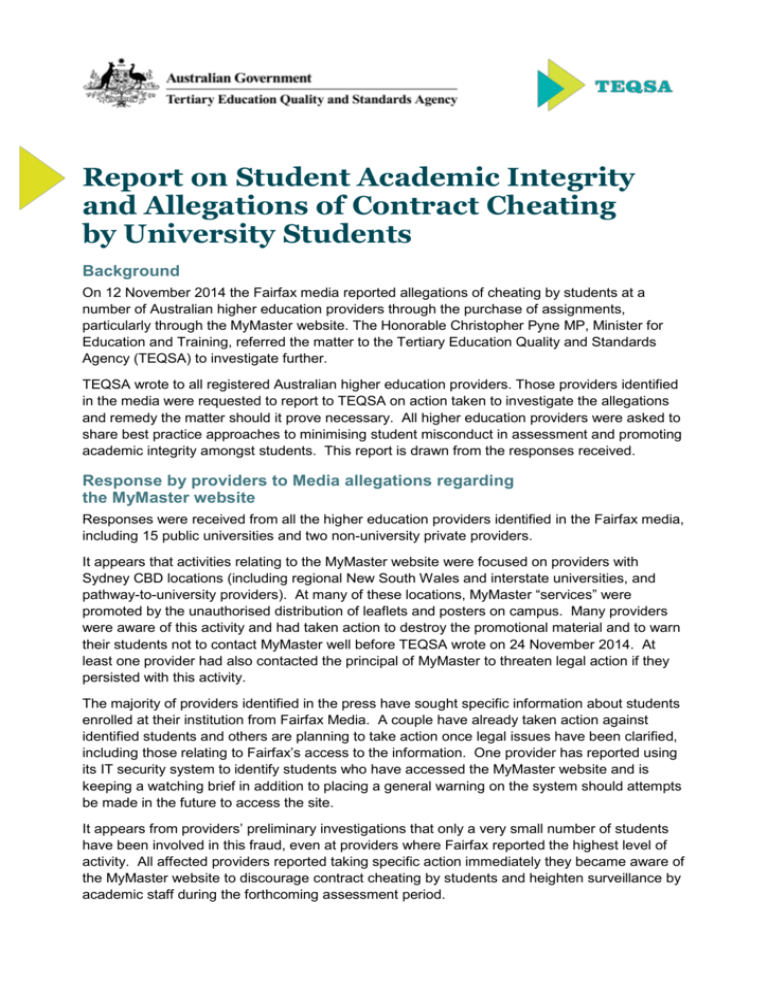
Report on Student Academic Integrity and Allegations of Contract Cheating by University Students Background On 12 November 2014 the Fairfax media reported allegations of cheating by students at a number of Australian higher education providers through the purchase of assignments, particularly through the MyMaster website. The Honorable Christopher Pyne MP, Minister for Education and Training, referred the matter to the Tertiary Education Quality and Standards Agency (TEQSA) to investigate further. TEQSA wrote to all registered Australian higher education providers. Those providers identified in the media were requested to report to TEQSA on action taken to investigate the allegations and remedy the matter should it prove necessary. All higher education providers were asked to share best practice approaches to minimising student misconduct in assessment and promoting academic integrity amongst students. This report is drawn from the responses received. Response by providers to Media allegations regarding the MyMaster website Responses were received from all the higher education providers identified in the Fairfax media, including 15 public universities and two non-university private providers. It appears that activities relating to the MyMaster website were focused on providers with Sydney CBD locations (including regional New South Wales and interstate universities, and pathway-to-university providers). At many of these locations, MyMaster “services” were promoted by the unauthorised distribution of leaflets and posters on campus. Many providers were aware of this activity and had taken action to destroy the promotional material and to warn their students not to contact MyMaster well before TEQSA wrote on 24 November 2014. At least one provider had also contacted the principal of MyMaster to threaten legal action if they persisted with this activity. The majority of providers identified in the press have sought specific information about students enrolled at their institution from Fairfax Media. A couple have already taken action against identified students and others are planning to take action once legal issues have been clarified, including those relating to Fairfax’s access to the information. One provider has reported using its IT security system to identify students who have accessed the MyMaster website and is keeping a watching brief in addition to placing a general warning on the system should attempts be made in the future to access the site. It appears from providers’ preliminary investigations that only a very small number of students have been involved in this fraud, even at providers where Fairfax reported the highest level of activity. All affected providers reported taking specific action immediately they became aware of the MyMaster website to discourage contract cheating by students and heighten surveillance by academic staff during the forthcoming assessment period. Contract cheating – the purchase of another person’s work to present as your own – has a long history. Recently, the ready availability of sophisticated communication technology and the rise of social media have increased the opportunity to access and/or repurpose another’s work to present as your own. Availability of essay writing services is pervasive with both local and international websites advertising their services. A number of assessment strategies have been devised to minimise the opportunity for such fraudulent activity by students and to detect it when it occurs. However it should be noted that the efficacy of such strategies has not been established and the favoured way to combat such behavior is by the promotion of academic integrity in the student body. Approaches to assessment and promotion of good student conduct are discussed in the next section of this report. Policies and procedures to promote academic integrity and deal with student academic misconduct in Australia’s higher education sector TEQSA pays particular attention to issues of academic integrity during provider registration and course accreditation. The Higher Education Standards Framework (Threshold Standards) 2011 has a number of standards relevant to academic integrity, including Provider Registration Standards 3.4, 3.8, 4.3 and 6.5 and Provider Course Accreditation Standards 3.1, 3.2, 4.4, 5.1 and 5.3. Among the providers identified by Fairfax Media, TEQSA is confident that all that have been reviewed by the Agency over the last three years have appropriate academic integrity policies and practices in place and meet the relevant Standards. It is noteworthy that all Australian public universities have their academic integrity policies and procedures available publically through their websites and through the website of the Asia Pacific Forum on Educational Integrity (see below). The responses received by TEQSA show that considerable effort has been spent by higher education providers in the last decade to promote academic integrity among students and staff. 1. Strengthening corporate and academic governance of student academic integrity All providers report regular consideration of academic misconduct matters by their Academic Board (or equivalent body), systematic analysis of findings and development of plans of action. Many providers report annually to their corporate governing body on student academic misconduct and on the outcome of strategies to promote a culture of academic integrity. A number of providers (eg University of Newcastle) enclosed a copy of their most recent academic integrity report to their governing body, which were exemplary. 2. Appropriate policies and procedures All providers report that they regularly review their policies and practices to: promote academic integrity; minimise opportunity for fraudulent assessment conduct by students; detect academic misconduct; and impose appropriate penalties. Many examples (eg University of Wollongong, La Trobe University) were provided to TEQSA which show thoughtful development of policies as teaching practices and delivery methods have changed. Virtually all providers that responded with a written report to TEQSA report the use of plagiarism detection (text-matching) software in the assessment of student assignments. A number of providers (eg Griffith University, University of Western Australia) have revised their policies recently to make specific reference to contract cheating. Report on Student Academic Integrity and Allegations of Contract Cheating by University Students | 2 3. Staff development The evidence collected by TEQSA shows that Australian higher education providers have invested significantly in increasing staff understanding of and capability in promoting and assuring student academic integrity (eg University of South Australia, University of Western Sydney). This includes: how to recognise and report suspected academic misconduct, including how to recognise non-original work such as purchased or repurposed work of others; being familiar with the provider’s policies and procedures relating to student academic misconduct; the appointment and training of academic integrity officers at Faculty /School level to promote an appropriate student culture and to investigate and deal with cases of suspected misconduct; the use of plagiarism detection software for educational purposes as well as for misconduct surveillance; promoting an understanding of the learning needs of particular student cohorts, including academic learning support and English language needs; and the appropriate design of student assessment. 4. Assessment design Evidence was provided to show that many providers are making a concerted effort to improve the quality of student assessment, both to better assess the learning outcomes achieved by students and to minimise the opportunity for fraudulent activity and academic misconduct. Some of the recent emphasis on assessment redesign has been driven by the requirement for all providers to be compliant with the Australian Qualifications Framework by 2015. Good assessment design features (eg University of Wollongong, Macquarie University, University of Technology Sydney) include: setting new assessment tasks each time the subject is taught requiring analysis and synthesis rather than simply factual recall and explanation using a variety of assessment tasks that are staged throughout the subject requiring group work on some assessment items requiring an invigilated component (or other form of face-to-face assessment ) and, in the case of some providers (eg Melbourne Institute of Technology), requiring the student to pass this component in addition to passing the subject overall using learning analytics to assess student engagement with the provider’s learning platform using early formative assessment and other mechanisms to identify students at risk of failure so that learning and language support can be offered directly assessing student performance in the workplace and other “authentic” assessment designs negotiating assessment tasks with students by encouraging them to participate with staff in the design of assessment tasks that are aligned with their specific learning experience and outcomes (eg RMIT, UTS) Report on Student Academic Integrity and Allegations of Contract Cheating by University Students | 3 With regard to the deterrence of “contract cheating”, the following assessment principles have been advanced as good practice 1 “just in time” announcement of written assignments in order to limit the time available to purchase the work of others (although there seems to be significant redundancy in the essay mill business and turn-around times can be very fast) encoding or electronic watermarking of assignment submissions emphasis on face-to-face (physical or virtual) assessment, including in-class essay writing personalisation of assessment by building in requirements that are specific to the student’s experience (eg linked to a guest speaker presentation) It is often considered that essays purchased through essay mills are less likely to be detected by anti-plagiarism software because they are kept behind firewalls and are supposedly bespoke products. However, this is not the experience of all providers (eg University of Sydney). Purchased work is usually detected because the quality of the academic content and/or language is significantly superior to the student’s usual performance in class or because the answer provided has a generic quality rather than addressing the specifics of the assignment task. It is widely regarded that the best way to detect and deter contract cheating is to “know your students”. 5. Student activities to promote academic integrity Most providers include the promotion of a culture of student academic integrity as a key aspect of their policy. Approaches to achieve this include: enacting a Student Charter or Code of Conduct which sets out expectations of student behavior, including honesty and integrity. Many providers have such a document and in New South Wales this has been enacted at State level for international students, with the Council of International Students Australia being a signatory requiring all undergraduate commencing students to successfully complete a module on academic integrity as a foundation requirement for progression in their degree program encouraging students to run their written assignments through plagiarism detection software (such as Turnitin) as an educational exercise before assignment submission students establishing Academic Integrity Societies (eg Macquarie University) to promote and support appropriate behavior in the student body. Asia Pacific Forum on Educational Integrity (APFEI) The APFEI was established in 2001 to promote academic integrity and best practice among university staff and students. Australia has played a leading role in the establishment and ongoing activities of the APFEI. The current Chair is Dr Ruth Walker of the University of Wollongong and six Australian Universities are institutional members (Adelaide, Deakin, Macquarie, Newcastle, Tasmania and Wollongong). 1 Newton, PM and Lang, C: Custom essay writers, freelancers and other paid third parties (forthcoming), preview provided by Dr Tracey Bretag; and Rogerson, A (2014): Personal communication. Report on Student Academic Integrity and Allegations of Contract Cheating by University Students | 4 The Forum has sponsored a well-attended conference on academic integrity every second year since 2003, covering areas such as plagiarism, culture and values, inclusive approaches and bridging the gap between policy and practice. The most recent conference was held at La Trobe University’s Melbourne CBD campus just two weeks ago on the topic of Engaging Designs of Academic Integrity Modules. TEQSA has been informed that the conference was fully subscribed within 24 hours of the call for registration. The APFEI website provides links to a variety of helpful resources, including those held and funded by the Office for Teaching and Learning in the Department of Education. The Academic Integrity Policies of all Australian universities are available on the APFEI website. Office for Learning and Teaching funded projects (OLT) The OLT (and its predecessor body the Australian Learning and Teaching Council) has been very active in funding projects to promote academic integrity. These projects have created broad engagement and collaboration across Australian universities and more recently have involved the private higher education sector. The nature of projects funded since 2010 runs from student responsibility to teaching and assessment to the design and implementation of policy. Recent project titles include: Academic integrity in Australia – understanding and changing culture and practice (led by Macquarie University, to be published in early 2015) Plagiarism and related issues in assessment not involving text (led by the University of Newcastle, to be published in early 2015) Working from the Centre: supporting unit and course coordinators to implement academic integrity policies, resources and scholarship (led by Victoria University, 2014) Web 2.0 authoring tools in higher education: new directions for assessment and academic integrity (led by the University of Melbourne, 2011) Investigating the efficacy of culturally specific academic literacy and academic honesty resources for Chinese students (led by Victoria University, 2010) Academic integrity standards: aligning policy and practice in Australian universities (led by the University of South Australia, 2013) Embedding and extending exemplary academic integrity policy and support frameworks across the higher education sector (led by the University of South Australia, 2014) The last project in the list is notable for the involvement of the private sector through the Queensland Institute of Business and Technology, which is owned by the large private provider Navitas and is a pathway college for Griffith University. The project also has a relationship with another Navitas owned pathway college, La Trobe University International College. Project reports and resources flowing from these projects are freely available from the OLT website and individual university websites with links across from the APFEI website. Report on Student Academic Integrity and Allegations of Contract Cheating by University Students | 5
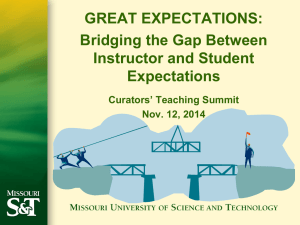



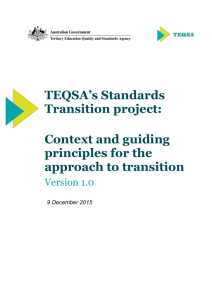
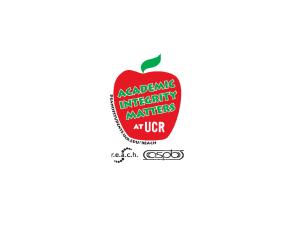


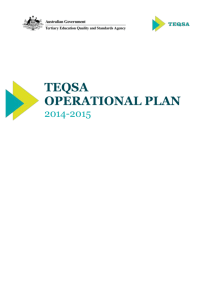
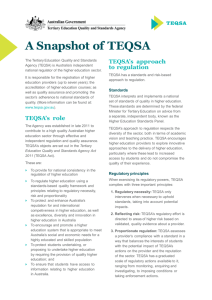
![Policy for public reporting of regulatory decisions [DOCX 1.4MB, 4 pg]](http://s3.studylib.net/store/data/006931699_2-8d1b75d461de233326f03f37bd00f391-300x300.png)
